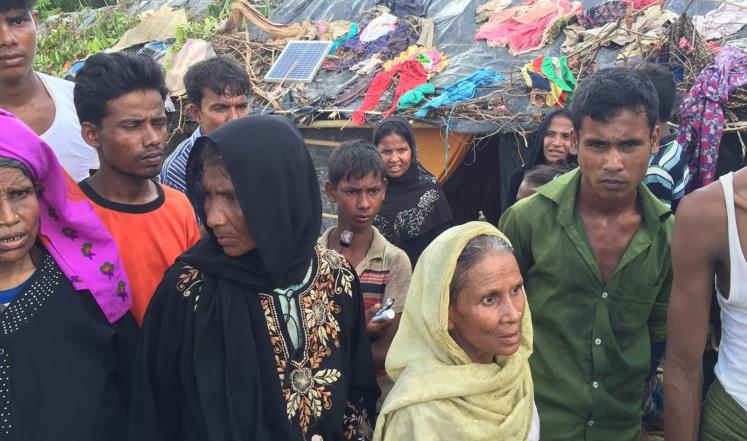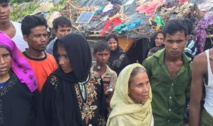Pramila Patten warned that Bangladeshi communities were struggling with the influx of some 620,000 refugees from northern Rakhine state since the latest crisis began.
Returning from a three-day visit to Cox's Bazar, Patten told reporters that host communities are falling below the poverty line as food prices are increasing, labour prices are decreasing, and tourism - one of the main industries - is down.
"The government of Bangladesh should be commended for containing the situation - but for how long? That is the question," Patten said.
Myanmar and Bangladesh are in discussions to repatriate the hundreds of thousands of Rohingya Muslims.
The UN Security Council issued a statement in early November calling on Myanmar’s government to end all violence and allow refugees to return home safely, but rights groups have expressed concern that the systematic nature of discrimination against ethnic Rohingyas makes it virtually impossible for them to go back.
The Rohingya have long faced discrimination even before the latest crisis broke out after an attack on security forces by the Arakan Rohingya Salvation Army on August 25 prompted widespread retaliation by Myanmar's military.
Patten said what she was told by Rohingya refugees painted a clear picture that sexual violence against Rohingya Muslim women has been "commanded, orchestrated, condoned and perpetrated" by the armed forces of Myanmar.
Patten heard stories of "the slaughter of babies - who represent the next generation and the future of their community," including multiple sources recounting Myanmar's armed forces going to villages, picking a baby and drowning it in a well, thereby also contaminating the local water supply.
Army forces who allegedly came into Rohingya villages and torched locals' homes then asked village leaders to sign documents stating they had torched their own houses, Patten said. Many women and girls who said they were victims of sexual assault and rape "still bore bite marks, bruises and scars attesting to their ordeal," Patten said.
The UN Population Fund has treated 1,644 women for various forms of sexual violence in the Bangladeshi camps, but "my guess is that this is the tip of the iceberg," Patten said.
The Security Council could refer the situation to the International Criminal Court and should establish an independent mechanism to gather and preserve evidence to ensure future criminal accountability, Patten said.
She welcomed the US announcement on Wednesday that it considers the situation in northern Rakhine ethnic cleansing against the Rohingya and Secretary of State Rex Tillerson’s calls for an independent investigation.
The US had not previously characterized the violence as ethnic cleansing as it undertook a review of the situation and had stopped short of calling it genocide or a crime against humanity, which would carry more serious legal and diplomatic ramifications.
Amnesty International this week released a report documenting the Myanmar government's systematic discrimination against the country's 1.1 million Muslims, saying the actions amounted to "apartheid," a crime against humanity.
The US resumed diplomatic relations with Myanmar, which it calls Burma, in 2012 after decades of isolating its military regime.
Officials said the US was unlikely to reinstate broad country-wide sanctions in the face of the ethnic cleansing, which Washington believes would be counterproductive to democratic advances in the Asian nation.
"The government of Bangladesh should be commended for containing the situation - but for how long? That is the question," Patten said.
Myanmar and Bangladesh are in discussions to repatriate the hundreds of thousands of Rohingya Muslims.
The UN Security Council issued a statement in early November calling on Myanmar’s government to end all violence and allow refugees to return home safely, but rights groups have expressed concern that the systematic nature of discrimination against ethnic Rohingyas makes it virtually impossible for them to go back.
The Rohingya have long faced discrimination even before the latest crisis broke out after an attack on security forces by the Arakan Rohingya Salvation Army on August 25 prompted widespread retaliation by Myanmar's military.
Patten said what she was told by Rohingya refugees painted a clear picture that sexual violence against Rohingya Muslim women has been "commanded, orchestrated, condoned and perpetrated" by the armed forces of Myanmar.
Patten heard stories of "the slaughter of babies - who represent the next generation and the future of their community," including multiple sources recounting Myanmar's armed forces going to villages, picking a baby and drowning it in a well, thereby also contaminating the local water supply.
Army forces who allegedly came into Rohingya villages and torched locals' homes then asked village leaders to sign documents stating they had torched their own houses, Patten said. Many women and girls who said they were victims of sexual assault and rape "still bore bite marks, bruises and scars attesting to their ordeal," Patten said.
The UN Population Fund has treated 1,644 women for various forms of sexual violence in the Bangladeshi camps, but "my guess is that this is the tip of the iceberg," Patten said.
The Security Council could refer the situation to the International Criminal Court and should establish an independent mechanism to gather and preserve evidence to ensure future criminal accountability, Patten said.
She welcomed the US announcement on Wednesday that it considers the situation in northern Rakhine ethnic cleansing against the Rohingya and Secretary of State Rex Tillerson’s calls for an independent investigation.
The US had not previously characterized the violence as ethnic cleansing as it undertook a review of the situation and had stopped short of calling it genocide or a crime against humanity, which would carry more serious legal and diplomatic ramifications.
Amnesty International this week released a report documenting the Myanmar government's systematic discrimination against the country's 1.1 million Muslims, saying the actions amounted to "apartheid," a crime against humanity.
The US resumed diplomatic relations with Myanmar, which it calls Burma, in 2012 after decades of isolating its military regime.
Officials said the US was unlikely to reinstate broad country-wide sanctions in the face of the ethnic cleansing, which Washington believes would be counterproductive to democratic advances in the Asian nation.









 Home
Home Politics
Politics











